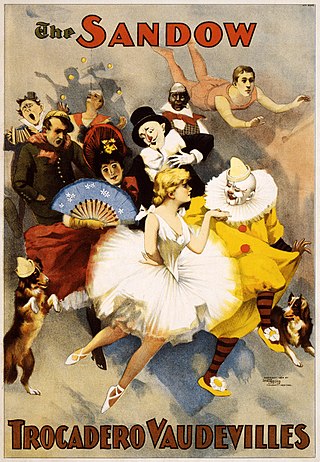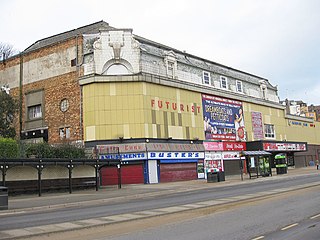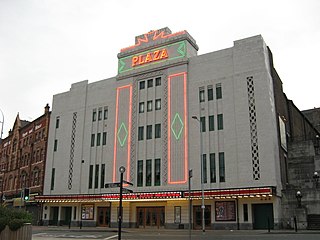
Gladys Louise Smith, known professionally as Mary Pickford, was a Canadian actress resident in the U.S., and also producer, screenwriter, and film studio founder. She was a pioneer in the American film industry, with a Hollywood career that spanned five decades.

A silent film is a film without synchronized recorded sound. Though silent films convey narrative and emotion visually, various plot elements or key lines of dialogue may, when necessary, be conveyed by the use of inter-title cards.

Vaudeville is a theatrical genre of variety entertainment which began in France at the end of the 19th century. A vaudeville was originally a comedy without psychological or moral intentions, based on a comical situation: a dramatic composition or light poetry, interspersed with songs or ballets. It became popular in the United States and Canada from the early 1880s until the early 1930s, while changing over time.

Leicester Square is a pedestrianised square in the West End of London, England. It was laid out in 1670 as Leicester Fields, which was named after the recently built Leicester House, itself named after Robert Sidney, 2nd Earl of Leicester. The square was originally a gentrified residential area, with tenants including Frederick, Prince of Wales and the artists William Hogarth and Joshua Reynolds. It became more down-market in the late 18th century as Leicester House was demolished and retail developments took place, becoming a centre for entertainment. Major theatres were built in the 19th century, which were converted to cinemas towards the middle of the next. Leicester Square is the location of nationally significant cinemas such as the Odeon Luxe Leicester Square and Empire, Leicester Square, which are often used for film premieres. The nearby Prince Charles Cinema is known for its screenings of cult films and marathon film runs. The square remains a tourist attraction which hosts events, including for the Chinese New Year.

A newsreel is a form of short documentary film, containing news stories and items of topical interest, that was prevalent between the 1910s and the mid 1970s. Typically presented in a cinema, newsreels were a source of current affairs, information, and entertainment for millions of moviegoers. Newsreels were typically exhibited preceding a feature film, but there were also dedicated newsreel theaters in many major cities in the 1930s and ’40s, and some large city cinemas also included a smaller theaterette where newsreels were screened continuously throughout the day.

The Empire, Leicester Square is a cinema currently operated by Cineworld on the north side of Leicester Square, London, United Kingdom.

The Odeon Luxe Leicester Square is a prominent cinema building in the West End of London. Built in the Art Deco style and completed in 1937, the building has been continually altered in response to developments in cinema technology, and was the first Dolby Cinema in the United Kingdom.

The Odeon Luxe West End is a two-screen cinema on the south side of Leicester Square, London. It has historically been used for smaller film premieres and hosting the annual BFI London Film Festival. The site is on an adjacent side of the square to the much larger flagship Odeon Luxe Leicester Square.

A double act is a form of comedy originating in the British music hall tradition, and American vaudeville, in which two comedians perform together as a single act, often highlighting differences in their characters' personalities. Pairings are typically long-term, in some cases for the artists' entire careers. Double acts perform on the stage, television and film.
Odeon Cinemas Limited, trading as Odeon, is a cinema brand name operating in the United Kingdom, Ireland and Norway, which along with UCI Cinemas and Nordic Cinema Group is part of the Odeon Cinemas Group subsidiary of AMC Theatres. It uses the famous name of the Odeon cinema circuit first introduced in Great Britain in 1930. As of 2016, Odeon is the largest cinema chain in the United Kingdom by market share.

Henry William George Lupino professionally Lupino Lane, was an English actor and theatre manager, and a member of the famous Lupino family, which eventually included his cousin, the screenwriter/director/actress Ida Lupino. Lane started out as a child performer, known as 'Little Nipper', and went on to appear in a wide range of theatrical, music hall and film performances. Increasingly celebrated for his silent comedy short subjects, he is best known in the United Kingdom for playing Bill Snibson in the play and film Me and My Girl, which popularized the song and dance routine "The Lambeth Walk".

The Redford Theatre is an atmospheric theatre in the Old Redford neighborhood of Detroit. The theatre opened in January 1928, advertised as "Detroit's most unique suburban theatre," due to its grand design, featuring Japanese and Chinese motifs.
The Gaumont-British Picture Corporation produced and distributed films and operated a cinema chain in the United Kingdom. It was established as an offshoot of the Gaumont Film Company of France.

The Futurist Theatre was a theatre and cinema in Scarborough, North Yorkshire, England. It was located on Foreshore Road, on the sea front of the South Bay.
George Black was a British theatrical impresario who controlled many entertainment venues during the 1930s and 1940s and was a pioneer of the motion picture business.

The Plaza is a Grade II* listed art deco single-screen cinema and theatre in Stockport, Greater Manchester, England. It opened in 1932, its construction having involved the excavation of the sandstone cliff behind it. After an initial closure in 1966 and a subsequent period in use as a bingo hall by Rank Leiure, it has now been restored as a cinema and theatre, showing films and staging live shows.

An actor or actress is a person who portrays a character in a production. The actor performs "in the flesh" in the traditional medium of the theatre or in modern media such as film, radio, and television. The analogous Greek term is ὑποκριτής (hupokritḗs), literally "one who answers". The actor's interpretation of a role—the art of acting—pertains to the role played, whether based on a real person or fictional character. This can also be considered an "actor's role", which was called this due to scrolls being used in the theaters. Interpretation occurs even when the actor is "playing themselves", as in some forms of experimental performance art.

Richard Rankin is a Scottish film, television and theatre actor. He is best known for the Scottish sketch show Burnistoun and as Roger Wakefield MacKenzie in the Starz drama Outlander.

The Odeon Cinema, Manchester was a former Odeon Cinema located on Oxford Street, Manchester, England. It was close to St. Peter's Square, within the Civic Quarter of Manchester city centre. It was demolished in April 2017, and replaced by Landmark, a 14-storey office building, as part of a major transformation of the area.
Sidney Millward was a British musician who led the comedy band Sid Millward and His Nitwits, performing burlesques of classical music from the 1930s until the 1970s.
















